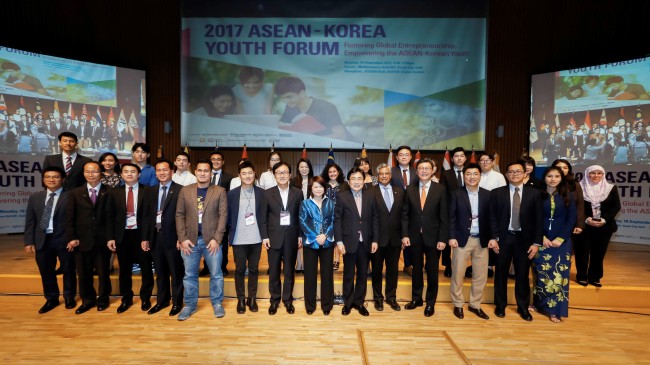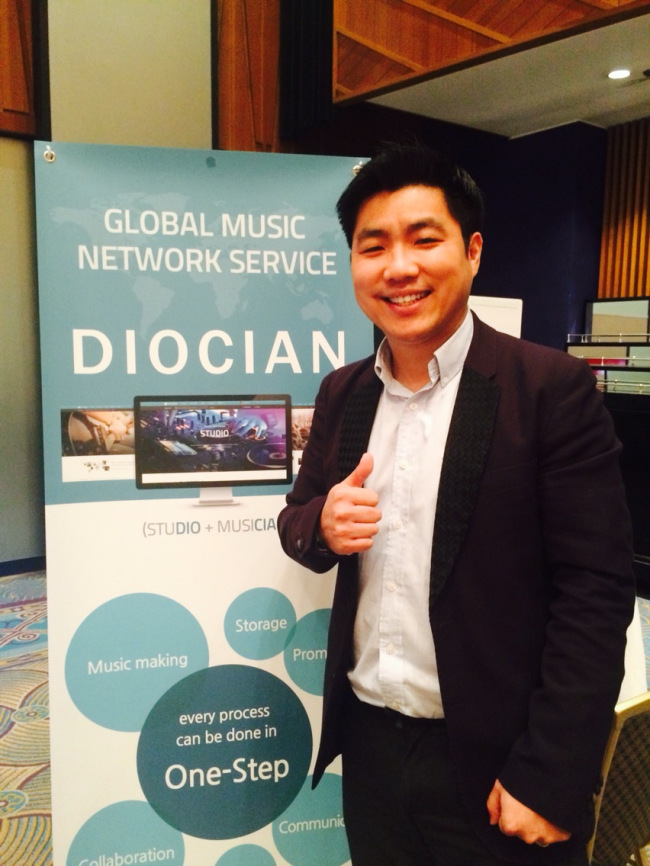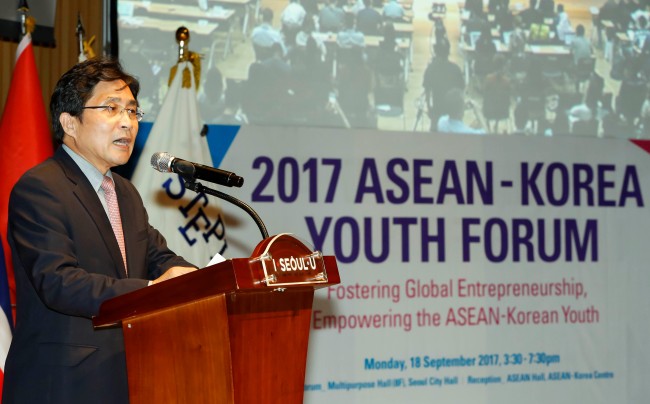Kim Doo-hwan was in dire straits as his father’s business was teetering on a slippery slope following the Asian financial crisis of 1997.
Kim, deprived but determined to succeed, worked countless odd jobs to pay for his tuition and living expenses when he entered university in the early 2000s. Eager to escape menial work, he launched an online advertising company after finishing his military service. The enterprise took off propitiously, and Kim made the bold decision to get out of his comfort zone and enter a conglomerate for more experience. He eventually landed in Silicon Valley in 2012.
“In the beginning, I was the typical Asian outlier in the fast-paced entrepreneurial core of Silicon Valley. But following the release of singer Psy’s global hit ‘Gangnam Style,’ everyone wanted to get up close and personal with me,” the founder and chief executive officer of Diocian, a company offering networking services to fledgling musicians worldwide, told a seminar audience on Sept. 18.
“People started perceiving Korea and Koreans as ‘cool,’ ‘exciting’ and ‘glamorous.’ It was only then I realized the power of content in human relationships that could be applied to business as well.”
 |
Organizers, speakers and students pose at the ASEAN-Korea Youth Forum designed to foster entrepreneurship at Seoul City Hall on Sept. 18 (ASEAN-Korea Center) |
Kim was one of three keynote speakers at the ASEAN-Korea Youth Forum, an annual event designed to foster global entrepreneurship and empower young people of the Association of Southeast Asian Nations, Korea and elsewhere. Organized by the ASEAN-Korea Center in Seoul, the event is annually held at the Seoul City Hall, and was co-hosted this year with the Seoul Metropolitan Government, Science and Technology Policy Institute and the United Nations Economic and Social Commission for Asia and the Pacific’s subregional office for East and Northeast Asia. The conference was also supported by the ASEAN Secretariat, Korea’s Ministry of Foreign Affairs and Hanwha Dreamplus.
Relying on his conviction, Kim established Diocian in 2013 to link artists with 45 music channels -- notably iTunes, YouTube Music, Apple Music, Soribada, Kakao Music, Melon, Line Music and Awa Music -- in 80 countries around the world. With offices in Korea, Japan, Vietnam and the United States and plans for expansion into China, Thailand, Indonesia and other Southeast Asian countries, Diocian takes charge of the whole commercialization process, from networking artists and partners to marketing and sales. The company allows artists to communicate with fans and share information, and profits are shared between artists and the company online.
“Within every crisis lies new opportunities,” he highlighted in front of some 200 university students of various nationalities. “Had my father’s business gone well through the 1997 crisis, I would not have created my own advertising company. Had I been content as a salaryman in a big company, I would not be standing here today.”
The key to spawning untapped opportunities in the whirlwind of uncertainty is to take concrete steps of finding a person who can help solve problems step by step, the entrepreneur advised. “There is always a way out of a quandary. Don’t be overly concerned by money, language difficulties and other obstacles. If you leap over these hurdles, brand new possibilities and horizons will appear in sight.”
 |
Kim Doo-hwan, the founder and chief executive officer of Diocian, a company offering networking services to fledgling musicians worldwide (Diocian) |
He also encouraged the students to experience the world as much as possible while they are still young, stressing that global exposure would widen their range of vision.
As for his future goals, Kim told The Korea Herald that he has set his eyes on investing in 10 countries by 2020 and guiding his company through its initial public offering.
Other speakers were Penny Low, the president and founder of Social Innovation in Singapore, who shared her career insights gleaned from undertaking socially benefiting innovation projects; and Mohammad Fitri Othman, CEO of TaniMac, a firm producing ergonomic agricultural tools.
Following the talks, teams of students presented their business proposals in front of the speakers, who acted as judges. Proposals included a mobile application providing location-specific matching services between international travelers and locals; software designed to maximize efficiency in sustainable waste management in Southeast Asia using geographic data; a biochemical solution for sustainable agriculture; and a mobile service designed to incentivize the use of public transit and bicycles in Seoul.
“Youth entrepreneurship is a key concept for ASEAN, as it aims for a socially responsible community,” said ASEAN-Korea Center Secretary-General Kim Young-sun. “We are living in a world far more complex than the one I grew up in. Part of what makes it so complicated is the entrepreneurialism of young bright minds like you. We need you to discover your ambitions, inspirations and desires to creatively figure out how to better live our lives and share our new prosperity with people around the world.”
 |
ASEAN-Korea Center Secretary-General Kim Young-sun (ASEAN-Korea Center) |
Dr. Song Jong-guk, president of the Science and Technology Policy Institute, said, “In the era of the ‘fourth industrial revolution,’ entrepreneurship is the key determinant of job creation and driving force of economic growth. To resolve today’s problems of youth unemployment worldwide, it is essential to support the discovery and incubation of startups, which gave birth to the likes of Uber and Airbnb.”
Kim Chang-beom, ambassador for international relations at the Seoul Metropolitan Government, underscored the importance South Korea attaches to ASEAN, signaled by President Moon Jae-in’s dispatching of Seoul Mayor Park Won-soon to the region as his special envoy in late May.
“Through Mayor Park’s visit to ASEAN earlier this year as a special envoy, I was able to confirm my belief that Korea’s future lies in ASEAN and ASEAN’s prosperity can go hand in hand with Korea’s future,” Kim said.
Noting that the ASEAN bloc has become Korea’s second-largest trade partner after China, with the two sides working to increase their bilateral trade to $200 billion by 2020, the envoy said that more than 300,000 ASEAN nationals live and work in Korea, crucially contributing to its economy and society.
The Seoul government has actively devised and implemented innovative initiatives and policies to tackle youth unemployment, he said, citing the Seoul Youth Policy Network, Seoul Youth Volunteer Scheme and Youth Allowance Program, as well as various special housing programs for youths and students.
By Joel Lee (
joel@heraldcorp.com)








![[Herald Interview] 'Trump will use tariffs as first line of defense for American manufacturing'](http://res.heraldm.com/phpwas/restmb_idxmake.php?idx=644&simg=/content/image/2024/11/26/20241126050017_0.jpg)
![[Exclusive] Hyundai Mobis eyes closer ties with BYD](http://res.heraldm.com/phpwas/restmb_idxmake.php?idx=644&simg=/content/image/2024/11/25/20241125050044_0.jpg)
